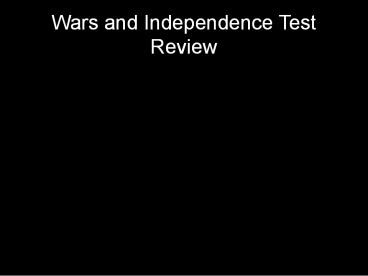Wars and Independence Test Review - PowerPoint PPT Presentation
1 / 6
Title:
Wars and Independence Test Review
Description:
Wars and Independence Test Review Describe how nationalism led to independence in India. (CRCT p. 187) Colonialism- when one countries government takes ... – PowerPoint PPT presentation
Number of Views:115
Avg rating:3.0/5.0
Title: Wars and Independence Test Review
1
Wars and Independence Test Review
2
Describe how nationalism led to independence in
India. (CRCT p. 187)
Colonialism- when one countries government takes
control or forces change over another.
August 15th, 1947 India gained freedom from
Britain and became an Independent Nation.
Great Britain controlled political, social,
economic, and cultural systems in India
Non-violent resistance, civil disobedience,
boycotting British schools, universities, and
courts leads to independence.
Citizen grew tired of this foreign control. Our
culture was ignored.
Nationalism- People of India were strongly
devoted to their country.
Why should Indian citizens become westernized or
more like the British?
Indian leaders such as Gandhi encouraged citizens
to buy Indian-made product and to boycott British
made goods.
Indian National Congress (1885)- worked to
achieve independence from the British
3
Describe the impact of Mohandas Gandhi's belief
in non-violent protests. (CRCT pp. 193-194)
Passive resistance wore down the British. Its
hard to fight against an enemy that wont fight
back.
The British offered to make changes to the
government to give more rights to some citizens.
The Untouchables were not included. I refused to
eat until ALL people received better treatment
I am Hindu, yet I have great respect for all
religions.
I was often imprisoned. While in jail, I would
fast.
The British Empire was getting rich from our
needs, we made our own product and did without
British products.
Organized march to the Arabian Sea where we
evaporated seawater to make salt. The British
taxed us a lot for salt, now we made our own.
We organized boycotts and rallies where we were
often beaten and arrested. I became the symbol
of a free India. Nicknamed Great Soul
4
Describe how nationalism led to independence in
Vietnam. (CRCT p. 188)
Before World War II, Vietnam was under French
Control.
This was the longest war the United States ever
fought, and the first one we ever lost.
During World War II Japan took control of the
region.
Viet Cong guerillas were able to reunite Vietnam
under a single Communist Government. Nationalist
movement.
Three-way civil war took place among the
Communists, the French, and the anit-communist
and anti-French Vietnamese.
The government of South Vietnam fell after the
U.S. left. The Communist government of the north
took over.
After 8 years of fighting, the French pulled out.
Vietnam was divided at the 17th parallel. North
Vietnam and South Vietnam
The U.S. sent money and weapons first, and
eventually sent troops to support the South.
Vietnamization- plan by the U.S. to turn the war
over to the South Vietnamese.
5
Explain the role of the United States in the
rebuilding of Japan after WWII. (CRCT p.195)
- Japan surrendered in 1945
- Industries farms destroyed
- Government in shambles
- General Douglas MacArthur was to put Japan back
together. - Japan should no longer pose a military threat to
other countries - MacArthur decided on a Constitutional Monarchy
for Japan - MacArthur wrote the constitution with a Bill of
Rights - Every Japanese citizen over the age of 20 was
allowed to vote - Japanese had to pay war reparations to countries
they harmed.
6
Explain the reasons for foreign involvement in
Korea in terms of containment of Communism. (CRCT
pp. 199-200)
Communist forces from U.S.S.R. took over the
northern portion during World War II
54,000 American deaths resulted
Armistice signed in 1953 to allow the 38th
Parallel remain the boundary
The United States freed the southern portion
No side could gain an advantage Seesaw War
Two countries were formed since the 2 superpowers
could not agree on one form of government
In 1950, the Communist north attacked the south.
U.S. U.N. presence angered China. China
entered the war assisting the north.
The United Nations and the U.S. sent troops to
help the South to keep communism from spreading
The 38th Parallel marked the border between the
two Koreas.































